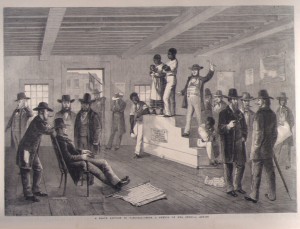Guest speaker Jeff Walsh
Have you ever started something well but at some point later things go off course?
Maybe it’s an exercise program or a diet. Or maybe you’ve supervised a group of workers or your kids, gotten them started on a project. Things were going well when you left, but when you return you find they’re doing it wrong now.
This is what happened to the apostle Paul. Paul and his companions were commissioned as missionaries, and on their first missionary journey they had traveled through the region of southern Galatia spreading the gospel message and establishing churches. In fact, on each of his first three missionary journeys, Paul traveled through Galatia. Most of the people who believed in Christ for salvation were Jews or God-fearers. God-fearers were Greek gentiles who had basically converted to Judaism and went to the synagogue for worship.
Paul had clearly preached Jesus as the true Messiah and the good news of salvation by faith in Jesus to them. However, sometime after Paul got home from his first journey he got some bad news from the churches in Galatia. Leaders in the churches in Galatia were not teaching salvation by faith in Christ alone. They were saying that you needed to first become a Jew, to follow the OT law, to be circumcised. They were saying that you can’t find salvation unless you first follow the way of the Jews.
So Paul said, “I’ve got to write to these churches and set them straight in this.” So he wrote and sent the letter we call today the book of Galatians. We’re going to read a portion of this letter this morning. And in this part of the letter Paul is telling the Galatian Christians that the law of the old covenant enslaves us, but Christ frees us and makes us actually sons of God.
Again the point in this passage is that the effect of the law is slavery for us, but the work of Christ is to make us free sons of God.
I. What does Paul mean when he says the law enslaves us?
The law’s effect is to make us slaves, in bondage.
A. The law is pictured as a jailor (v.23).
1. A good translation: “we were held in custody by the law, imprisoned until the coming faith would be revealed”
2. The law is like Marshal Dillon. He’s got us locked up, not only because we are sinful but for our own protection.
B. The law is pictured as a paidogogos (v. 24-25).
1. A hired person, or in some cases a slave, who was given authority over a child in the household and supervised the child.
2. Closest thing in our culture might be the role of a nanny.
C. The law is pictured as the steward of the legal heir in a wealthy Greco-Roman household (4:1-3).
1. In wealthy homes in the Roman Empire it was common for the father to place a steward in charge of his son.
2. Before the child has reached the age of maturity (which is determined by the father), the son demonstrated his love and obedience for the father by submitting to the steward in all things.
3. The son is “no different from a slave” (v.1) in the sense that, during his growing up years, he does not yet have the authority or wealth that will be his by right of inheritance.
D. Together, these three pictures tell us the purpose of the law of God, given through Moses to his people.
1. The law’s function was preliminary, like the opening act of God’s drama of redemption.
-One writer said that the law is elementary teaching – the ABCs of God’s revelation.
2. All three of these pictures convey the idea of bondage.
-The law was given to show us how utterly hopeless our condition is.
-The law teaches us there is no way we can have a right relationship with the holy Creator on our own merit. We need help big time! And that help can’t come from us; it’s got to come from God.
E. If you don’t know Christ Jesus, you are in bondage to something. The purpose of God’s law is to show all people that truth. It’s not that we just need to grow up, to mature; we need to be redeemed, bought out of a situation in which we are powerless to do anything.
II. What is the solution?
We are freed/redeemed from slavery to the law by Christ and adopted as sons. (4:4-5)
A. The language of redemption is the language of the marketplace, of buying and selling.
1. God has purchased us to redeem us from the captivity of the law. He paid our price and freed us.
2. In Memphis a few weeks ago, Francis Ssebikindu showed us the place that in former times was a slave market.
3. The Giver of the law released us from that law by paying the law’s demands Himself.
B. What’s more, we were not only redeemed from the law, we have received adoption as sons.
1. Paul is drawing a concept from the Roman law and culture of his time.
2. In the ancient world adoption had a wider scope than it does today.
-A son was considered the legal property of his father.
-Legally fathers had the right to sell their sons or transfer that ownership to another by adoption.
-If a son was transferred by adoption from one father to another, all legal ties with the biological family were cut. But the son gained all the full legal rights of his new family, including inheritance rights from the father.
3. This is what Paul means when he says we were redeemed “so that we might receive adoption as sons” (4:5). Cf. (4:7 “So you are no longer a slave, but a son, and if a son, then an heir through God.”)
III. What is this new sonship in God’s family all about? What does it really mean?
We can only understand and live out our sonship in light of the one true natural Son.
A. Only in and through Christ do we become adopted sons of God.
1. (3:26-27) “for in Christ Jesus you are all sons of God, through faith. For as many of you as were baptized into Christ have put on Christ.”
2. No Christ = no adoption
B. Our place in God’s family as adopted sons rests on the fact that Jesus is the eternal Son of God by nature.
1. “But when the fullness of time had come, God sent forth his Son, born of woman, born under the law, to redeem those who were under the law…” (4:4-5)
2. The Bible in both the Old and New Testaments, refers several times to Jesus as Son of God.
-In the ancient world this designation was clearly understood as meaning equal with God or God himself.
-Jesus claimed, “I and the Father are one” (John 10:30)
-The true Son of God has this indescribable eternal relationship with the Father.
3. But the Holy Spirit makes it possible for us to share in that incredible relationship as adopted sons.
–“I in them and you in me” (John 17:23)
-If it weren’t for the fact of Jesus’ eternal true Sonship, we would never share in that as adopted sons.
4. The Bible doesn’t say that Jesus is the Son of God because we have father/son relationships on earth and that’s the best way we can describe the relationship of Jesus to the Father. It’s actually the opposite, we have father/son relationships on earth because they reflect the eternal relationship of God the Father with God the Son. Our relationships are shadows (or outlines) of the true relationship in God himself.
5. And God says you can share in that eternal relationship between God the Father and God the Son by becoming adopted sons of God through faith in the Son of God.
Conclusion
The message of this passage in Galatians is to keep Jesus Christ, the one true eternal Son of God, as the head, the focal point, the absolute priority in our lives. We dare not lose sight of Christ and go off course.
 Three weeks ago I was in Wilmington, and I visited the Battleship North Carolina. The battleship was equipped with sophisticated navigation instruments, including two highly accurate gyroscope compasses, to keep it on course. Because they knew you can have all the firepower in the world, but if you lose your way you’re not going to do anything.
Three weeks ago I was in Wilmington, and I visited the Battleship North Carolina. The battleship was equipped with sophisticated navigation instruments, including two highly accurate gyroscope compasses, to keep it on course. Because they knew you can have all the firepower in the world, but if you lose your way you’re not going to do anything.
We won’t lose our way if we as a church live as adopted sons of God by faith in the Son of God.
http://www.buzzsprout.com/8612/99382-adopted-sons-galatians-3-23-4-7







